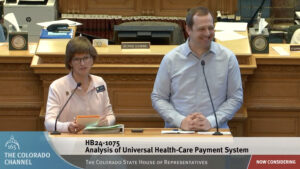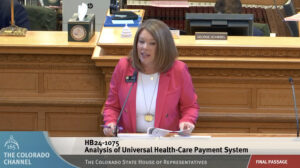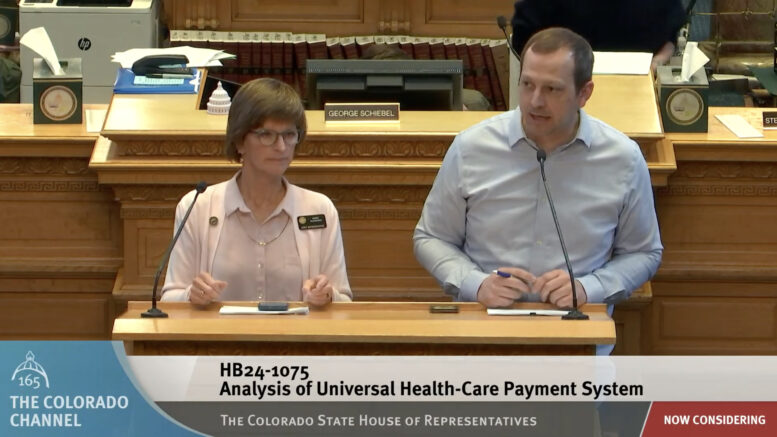For the second year in a row, Colorado House members on Monday passed a bill to study what it would take to create a single-payer health-care system in Colorado, though its price tag and ideological bent could again present problems for it in the Senate.
House Bill 1075 has reignited a nearly decade-old debate — whether residents would save money if the state government eliminated the private insurance system and took on a Canadian-style role in determining and dispensing all payments for health-care services. Sponsored by Democratic Reps. Andy Boesenecker of Fort Collins and Karen McCormick of Longmont, it directs the Colorado School of Public Health to analyze model legislation for creating a universal health-care payment system and report its findings to the Legislature.
In 2016, Colorado voters rejected creation of a $25 billion public universal health-care system by a margin of 79% to 21%, and one year later the legislatively created Colorado Commission on Affordable Care recommended against such a plan too. A 2021 task force found such a system could reduce the $38.3 billion paid by residents between 1.4% and 9.7% but added that “financial health of hospitals and clinics and clinician retention should be carefully considered with any potential pricing regulations.”
Boesenecker and McCormick then returned last year to seek funding for a broader study, with Boesenecker saying that he wanted to bring a diverse group of people to the table, examine the issue in a new way and ask hard questions of it. It died on the calendar at the end of the 2023 session when Senate leaders did not bring it up for debate.
What’s new about the idea for 2024
This year’s version of the bill is similar to last year’s, prescribing that CSPH estimate costs of a single-payer program for 10 years, consider a program that covers health-care benefits at 120% of Medicare rates and identify provider reimbursement rates at levels that result in net income “that will attract and retain necessary health-care providers.” It requires analysis of how a universal health-care system could impact people of various races and socioeconomic groups, health-care facilities, health insurers, federally regulated large-group health insurance plans and the Colorado Option plan.

Colorado state Rep. Karen McCormick speaks in the House about her single-payer bill while cosponsoring Rep. Andy Boesenecker listens on Saturday.
McCormick, in House debate on Saturday, acknowledged that voters rejected this idea eight years ago but said that was due to sponsors of Amendment 69 failing to do their homework or answer many questions about how such a system would work. This study would allow CSPH to dig into those questions and provide needed answers in a way that either could prepare single-payer proponents the ability to move forward more successfully or could put the issue to bed for once and for all, she said.
“The people of Colorado have been asking for an answer to questions of if we could have a coverage system in our state that would cover everyone but would be privately delivered,” she said. “This is the kind of homework that needs to be done if we’re going to consider any kind of next step.”
Republicans offer united opposition to single-payer plan
But opponents — all Republicans in the House voted against HB 1075 along with Democratic Rep. Bob Marshall of Highlands Ranch — argued that the bill in written in such a way that it slants the study toward a positive acclimation of a single-payer system. For example, the draft model legislation CSPH must present at the first meeting of an “analysis collaborative” to examine it must be created, according to the bill, by a Colorado nonprofit that prioritizes a universal health-care system, noted Rep. Gabe Evans, R-Fort Lupton.
Also, noted GOP Rep. Brandi Bradley of Roxborough Park, the analysis collaborative is filled with likely supporters of the idea and few people who would question the premise of single-payer health care or examine its shortfalls in other places it’s been implemented. There is no representative of the insurance industry proposed to be on it, for example, but there are advocates for organized labor, people experiencing homelessness, the LGBTQ community, historically marginalized communities and abortion rights.

Colorado state Rep. Brandi Bradley speaks against a bill to fund a study of a single-payer healthcare system before its final House approval on Monday.
While Republicans who have lived abroad spoke about the wait times to receive care in single-payer countries, others questioned why the state, in a tight budget year, would dedicate more than $240,000 to this study. Changes in committees lowered the price from $400,000 by reducing the number of public meetings and extending the repot deadline until December 2025, but any bill seeking more than $200,000 this year is considered high-priced because of limited budget room.
Uncertain future for single-payer study
“We don’t need to be spending money on this silliness. The citizens of Colorado have spoken over and over and over again,” said Rep. Lisa Frizell, R-Castle Rock, warning that moving to institute such a system would lead to an exodus of doctors from the state. “There is a reason why people don’t want to go into health care. There are lots of reasons. But creating an unstable environment is one of them.”
After the 42-19 vote Monday, the bill heads to the more moderate Senate, where it lingered on the calendar and eventually died last year because of a seeming lack of enthusiasm in that chamber.
Boesenecker said he will continue to push HB 1075 as “a homework assignment that we are giving the Colorado School of Public Health.” It remains to be seen if senators will be as eager to make that assignment.
